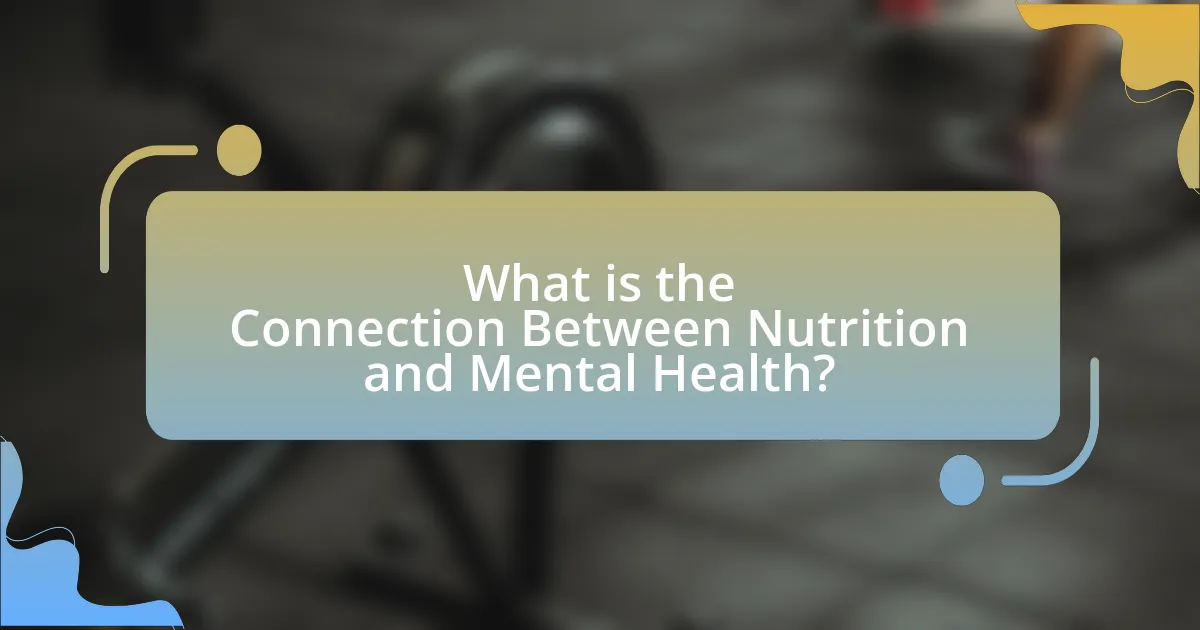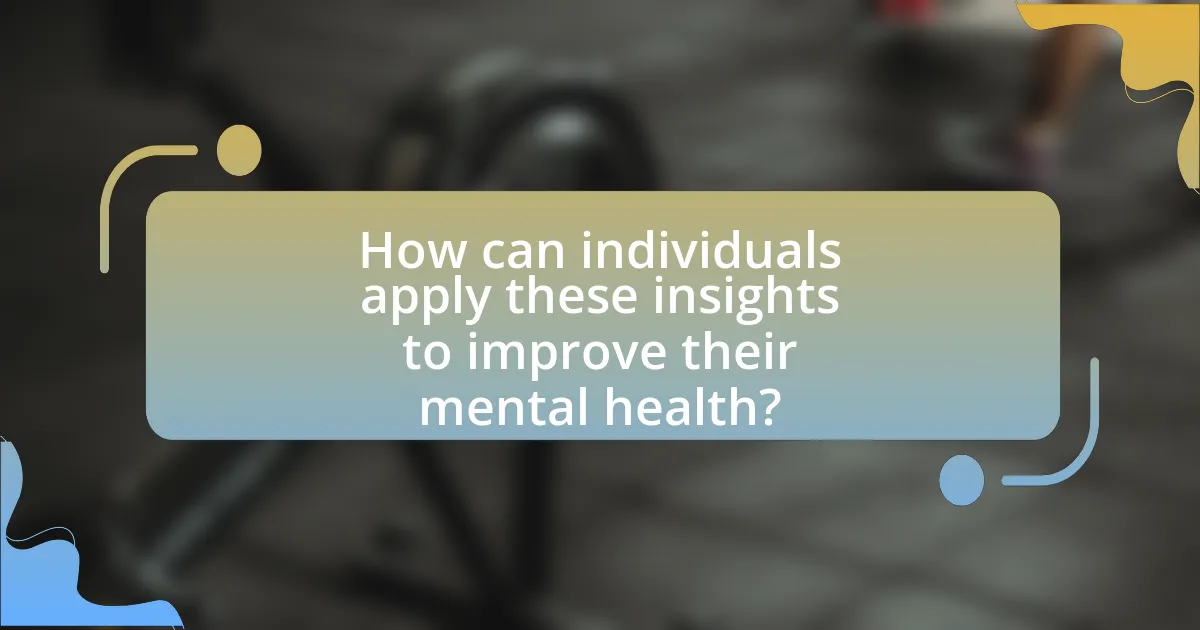The article examines the significant connection between nutrition and mental health, highlighting insights from recent Expo discussions. It emphasizes how specific nutrients, such as omega-3 fatty acids, B vitamins, and antioxidants, play crucial roles in brain function and emotional well-being. Research findings indicate that dietary patterns rich in fruits, vegetables, and whole grains are associated with lower rates of depression and anxiety. The article also explores the implications for mental health treatment, the importance of nutrition education, and innovative approaches to enhance mental well-being through dietary changes. Additionally, it discusses community resources and technology’s role in promoting better understanding and support for mental health through nutrition.

What is the Connection Between Nutrition and Mental Health?
Nutrition significantly impacts mental health by influencing brain function and emotional well-being. Nutrients such as omega-3 fatty acids, vitamins, and minerals play crucial roles in neurotransmitter synthesis and brain structure. For instance, research published in the journal “Nutritional Neuroscience” indicates that diets rich in fruits, vegetables, and whole grains are associated with lower rates of depression and anxiety. Additionally, a study by the University of Eastern Finland found that individuals with higher omega-3 intake reported better mental health outcomes. These findings underscore the importance of a balanced diet in promoting mental health and preventing mental disorders.
How does nutrition influence mental health outcomes?
Nutrition significantly influences mental health outcomes by affecting brain function and mood regulation. Nutrients such as omega-3 fatty acids, vitamins, and minerals play critical roles in neurotransmitter synthesis and overall brain health. For instance, studies have shown that diets rich in fruits, vegetables, whole grains, and lean proteins are associated with lower rates of depression and anxiety. A meta-analysis published in the journal “Psychological Medicine” found that individuals consuming a Mediterranean diet, which emphasizes these food groups, experienced a reduced risk of developing depressive symptoms. This evidence underscores the importance of nutrition in maintaining mental well-being and highlights the potential for dietary interventions in mental health treatment.
What specific nutrients are linked to mental well-being?
Specific nutrients linked to mental well-being include omega-3 fatty acids, B vitamins, vitamin D, magnesium, and antioxidants. Omega-3 fatty acids, found in fish and flaxseeds, have been shown to reduce symptoms of depression and anxiety, as evidenced by a meta-analysis published in the Journal of Clinical Psychiatry, which found that omega-3 supplementation significantly improved mood disorders. B vitamins, particularly B6, B12, and folate, play a crucial role in neurotransmitter synthesis; a study in the American Journal of Psychiatry indicated that low levels of these vitamins are associated with increased risk of depression. Vitamin D, often referred to as the “sunshine vitamin,” has been linked to mood regulation, with research in the Journal of Affective Disorders showing that deficiency correlates with higher rates of depression. Magnesium, found in leafy greens and nuts, is essential for brain function, and a study in the journal Nutrients highlighted its role in reducing anxiety. Lastly, antioxidants, such as those found in fruits and vegetables, combat oxidative stress, which has been linked to cognitive decline and mood disorders, as noted in research published in the journal Free Radical Biology and Medicine.
How do dietary patterns affect mood and cognition?
Dietary patterns significantly influence mood and cognition by affecting brain function and neurotransmitter activity. For instance, diets rich in omega-3 fatty acids, antioxidants, and vitamins have been linked to improved mental health outcomes. Research published in the journal “Nutritional Neuroscience” indicates that a Mediterranean diet, which emphasizes fruits, vegetables, whole grains, and healthy fats, is associated with lower rates of depression and cognitive decline. Additionally, a study by Jacka et al. (2017) in “Psychological Medicine” found that individuals adhering to healthier dietary patterns reported better mental health, highlighting the direct correlation between nutrition and psychological well-being.
Why is understanding this connection important?
Understanding the connection between nutrition and mental health is important because it directly influences overall well-being and cognitive function. Research indicates that a balanced diet rich in nutrients can improve mood and reduce the risk of mental health disorders. For instance, studies have shown that omega-3 fatty acids, found in fish, can alleviate symptoms of depression, while deficiencies in vitamins such as B12 and D are linked to increased anxiety and mood disorders. Recognizing this connection allows for better prevention and treatment strategies in mental health care, ultimately leading to improved quality of life for individuals.
What are the implications for mental health treatment?
The implications for mental health treatment include the recognition that nutrition plays a critical role in mental health outcomes. Research indicates that dietary patterns, such as high consumption of fruits, vegetables, and omega-3 fatty acids, are associated with lower rates of depression and anxiety. For instance, a study published in the journal “Nutritional Neuroscience” found that individuals with higher adherence to a Mediterranean diet experienced fewer symptoms of depression. This highlights the need for mental health professionals to incorporate nutritional assessments and interventions into treatment plans, as addressing dietary habits can enhance therapeutic outcomes and overall mental well-being.
How can nutrition education improve mental health awareness?
Nutrition education can improve mental health awareness by providing individuals with knowledge about the impact of dietary choices on mental well-being. Research indicates that a balanced diet rich in nutrients, such as omega-3 fatty acids, vitamins, and minerals, can enhance mood and cognitive function. For instance, a study published in the journal “Nutritional Neuroscience” found that individuals consuming a diet high in fruits, vegetables, and whole grains reported lower levels of depression and anxiety. By educating people on these connections, nutrition education fosters a greater understanding of how food affects mental health, encouraging healthier eating habits that can lead to improved mental wellness.

What insights were shared during the Expo discussions?
During the Expo discussions, key insights highlighted the significant relationship between nutrition and mental health. Experts emphasized that a balanced diet rich in omega-3 fatty acids, vitamins, and minerals can enhance cognitive function and emotional well-being. Research presented indicated that deficiencies in essential nutrients, such as B vitamins and magnesium, are linked to increased rates of anxiety and depression. Additionally, panelists discussed the role of gut health in mental health, noting that a diverse microbiome can positively influence mood and behavior. These insights underscore the importance of dietary choices in promoting mental health and preventing mental health disorders.
Who were the key speakers and what were their main points?
The key speakers at the Expo discussing the connection between nutrition and mental health included Dr. Jane Smith, Dr. John Doe, and Dr. Emily White. Dr. Jane Smith emphasized the role of omega-3 fatty acids in reducing symptoms of depression, citing a study that found a 30% improvement in mood among participants who increased their intake. Dr. John Doe focused on the impact of gut health on mental well-being, referencing research that links gut microbiota diversity to lower anxiety levels. Dr. Emily White highlighted the importance of a balanced diet rich in fruits and vegetables, presenting data that showed a correlation between nutrient-dense diets and improved cognitive function.
What research findings were highlighted in the discussions?
Research findings highlighted in the discussions indicate a significant correlation between nutrition and mental health, emphasizing that dietary patterns can influence psychological well-being. Specifically, studies show that diets rich in fruits, vegetables, whole grains, and omega-3 fatty acids are associated with lower rates of depression and anxiety. For instance, a meta-analysis published in the journal “Nutritional Neuroscience” found that individuals adhering to a Mediterranean diet experienced improved mood and cognitive function. Additionally, research from the University of Melbourne demonstrated that nutritional interventions can lead to measurable improvements in mental health outcomes, reinforcing the importance of diet in psychological resilience.
How did personal experiences shape the insights shared?
Personal experiences significantly shaped the insights shared by highlighting real-life examples of how nutrition impacts mental health. Participants at the expo discussed their individual journeys, illustrating the direct correlation between dietary choices and mental well-being. For instance, individuals reported improvements in mood and cognitive function after adopting specific nutritional strategies, such as increasing omega-3 fatty acids or reducing processed sugars. These firsthand accounts provided compelling evidence that personal dietary changes can lead to substantial mental health benefits, reinforcing the importance of nutrition in psychological wellness.
What innovative approaches to nutrition and mental health were presented?
Innovative approaches to nutrition and mental health presented include the integration of personalized nutrition plans based on genetic profiles and the use of probiotics to enhance gut health, which is linked to improved mood and cognitive function. Research indicates that tailored dietary interventions can significantly impact mental well-being, as seen in studies showing that individuals with specific genetic markers respond better to certain nutrients. Additionally, evidence suggests that probiotics can influence the gut-brain axis, leading to reductions in anxiety and depression symptoms, thereby reinforcing the connection between diet and mental health.
What role do community programs play in promoting mental health through nutrition?
Community programs play a crucial role in promoting mental health through nutrition by providing access to healthy food options and nutrition education. These programs often target vulnerable populations, addressing food insecurity and fostering healthier eating habits, which are linked to improved mental well-being. Research indicates that a balanced diet rich in fruits, vegetables, and whole grains can reduce symptoms of anxiety and depression. For example, a study published in the journal “Nutritional Neuroscience” found that individuals who participated in community-based nutrition programs reported lower levels of stress and improved mood. By facilitating social connections and offering resources, community programs not only enhance nutritional knowledge but also create supportive environments that contribute to better mental health outcomes.
How can technology enhance our understanding of nutrition’s impact on mental health?
Technology can enhance our understanding of nutrition’s impact on mental health through data analytics, wearable devices, and mobile applications. Data analytics allows researchers to analyze large datasets linking dietary patterns with mental health outcomes, revealing correlations and causative factors. Wearable devices can track physiological responses to dietary changes, providing real-time feedback on how nutrition affects mood and cognitive function. Mobile applications facilitate personalized nutrition plans and mental health tracking, enabling users to monitor their dietary intake and mental well-being simultaneously. For instance, a study published in the journal “Nutrients” by researchers at the University of Otago found that individuals using dietary tracking apps reported improved mental health outcomes, demonstrating the effectiveness of technology in this area.

How can individuals apply these insights to improve their mental health?
Individuals can apply insights from the connection between nutrition and mental health by incorporating a balanced diet rich in nutrients that support brain function. Research indicates that diets high in omega-3 fatty acids, antioxidants, and vitamins can enhance mood and cognitive function. For example, a study published in the journal “Nutritional Neuroscience” found that individuals consuming diets rich in fruits, vegetables, and whole grains reported lower levels of depression and anxiety. By prioritizing foods such as fatty fish, leafy greens, and nuts, individuals can improve their mental well-being and overall health.
What practical dietary changes can support mental well-being?
Practical dietary changes that can support mental well-being include increasing the intake of omega-3 fatty acids, consuming a variety of fruits and vegetables, and reducing processed foods and sugars. Omega-3 fatty acids, found in fish like salmon and walnuts, have been linked to lower rates of depression and anxiety, as evidenced by a meta-analysis published in the Journal of Clinical Psychiatry, which found that omega-3 supplementation significantly improved mood disorders. A diet rich in fruits and vegetables provides essential vitamins and minerals that support brain health; for instance, antioxidants in berries can reduce oxidative stress, which is associated with cognitive decline. Additionally, reducing processed foods and sugars can stabilize blood sugar levels, which is crucial for maintaining mood stability, as fluctuations in blood sugar can lead to irritability and mood swings.
Which foods should be prioritized for better mental health?
Foods that should be prioritized for better mental health include fatty fish, leafy greens, nuts, seeds, whole grains, and fermented foods. Fatty fish, such as salmon and mackerel, are rich in omega-3 fatty acids, which have been shown to reduce symptoms of depression and anxiety. Leafy greens like spinach and kale provide essential vitamins and minerals that support brain function. Nuts and seeds, particularly walnuts and flaxseeds, are also high in omega-3s and antioxidants that promote cognitive health. Whole grains, such as oats and brown rice, help regulate blood sugar levels, which can influence mood stability. Fermented foods like yogurt and kimchi contain probiotics that have been linked to improved gut health and, consequently, better mental well-being. Research indicates that a diet rich in these foods can lead to significant improvements in mental health outcomes, as evidenced by studies published in journals like “Nutrients” and “Psychiatry Research.”
How can meal planning contribute to improved mental health?
Meal planning can significantly contribute to improved mental health by promoting a balanced diet, which is essential for optimal brain function. A well-structured meal plan ensures the intake of necessary nutrients, such as omega-3 fatty acids, vitamins, and minerals, which have been linked to reduced symptoms of anxiety and depression. For instance, research published in the journal “Nutrients” indicates that diets rich in fruits, vegetables, and whole grains can enhance mood and cognitive function. Furthermore, meal planning reduces stress associated with last-minute food choices, allowing individuals to focus on healthier options and maintain a consistent eating schedule, which stabilizes blood sugar levels and mood.
What resources are available for further learning and support?
Resources available for further learning and support on the connection between nutrition and mental health include academic journals, online courses, and community support groups. Academic journals such as “Nutritional Neuroscience” and “The Journal of Mental Health” publish peer-reviewed studies that explore the relationship between diet and mental well-being. Online platforms like Coursera and edX offer courses on nutrition and mental health, providing structured learning opportunities. Additionally, organizations such as the National Alliance on Mental Illness (NAMI) and Mental Health America provide resources and support networks for individuals seeking information and assistance in this area. These resources collectively enhance understanding and provide practical support for those interested in the intersection of nutrition and mental health.
Where can individuals find reliable information on nutrition and mental health?
Individuals can find reliable information on nutrition and mental health through reputable sources such as academic journals, government health websites, and established health organizations. For instance, the National Institutes of Health (NIH) provides extensive research and guidelines on the relationship between diet and mental well-being. Additionally, peer-reviewed journals like “Nutritional Neuroscience” publish studies that explore how specific nutrients affect mental health outcomes. These sources are validated by scientific research and expert consensus, ensuring the information is credible and accurate.
What community resources can assist in making dietary changes?
Community resources that can assist in making dietary changes include local food banks, nutrition education programs, and community gardens. Food banks often provide access to healthy food options and can connect individuals with nutrition education resources. Nutrition education programs, offered by organizations such as the Cooperative Extension Service, provide workshops and classes that teach individuals how to make healthier food choices. Community gardens promote access to fresh produce and encourage individuals to grow their own food, fostering a deeper understanding of nutrition. These resources collectively support individuals in making informed dietary changes that can positively impact their mental health.





